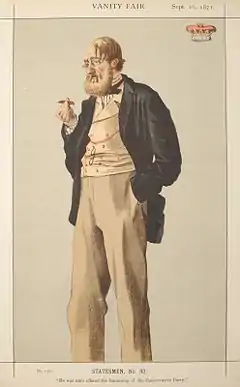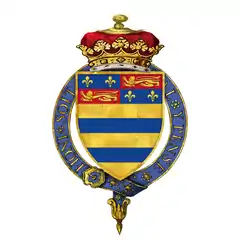Charles Manners, 6th Duke of Rutland
Charles Cecil John Manners, 6th Duke of Rutland KG (16 May 1815 – 3 March 1888, in Belvoir Castle), styled Marquess of Granby before 1857, was an English Conservative politician.


Background and education
Manners was the third but eldest surviving son of John Manners, 5th Duke of Rutland and Lady Elizabeth Howard, daughter of Frederick Howard, 5th Earl of Carlisle. John Manners, 7th Duke of Rutland and Lord George Manners were his younger brothers. He was educated at Eton and Trinity College, Cambridge, earning an MA in 1835.[1]
Political career
Entering politics as Member of Parliament for Stamford in 1837, Manners became known as a voluble, if not particularly talented, protectionist. He briefly held office as a Lord of the Bedchamber to Prince Albert from 1843 to 1846.[2] Following the resignation of Lord George Bentinck from the leadership of the protectionists in the House of Commons at the beginning of 1848, Granby (as he was then known) became leader on 10 February 1848, as Benjamin Disraeli was unacceptable to Lord Derby, the overall leader of the party, and the majority of the rank and file. Granby resigned on 4 March 1848, feeling himself inadequate to the post, and the party functioned without an actual leader in the Commons for the remainder of the parliamentary session.
At the start of the next session, affairs were handled by the triumvirate of Granby, Disraeli, and J. C. Herries. This confused arrangement ended with Granby's resignation in 1851. He also declined to join the First Derby Ministry in 1852, and was appointed Lord Lieutenant of Lincolnshire instead. Granby succeeded to the dukedom of Rutland on the death of his father in 1857. He was made a Knight of the Garter in 1867. He also succeeded his father as Lord Lieutenant of Leicestershire, which post he held until his death on 4 March 1888,[2] at the age of 72.
Personal life
Rutland never married. He had cherished a passion for Mary Anne Ricketts, later Lady Forester, but his father forbade the two to marry. He was also devoted to Lady Miles, wife of Sir Philip Miles, and scandalised society by leaving her his 120 ft yacht, Lufra, in his will.[3] He was succeeded in the dukedom by his brother John.[2]
Notes
- "Granby, Charles Cecil John, Marquess of (GRNY832CC)". A Cambridge Alumni Database. University of Cambridge.
- Archbold 1893.
- Anne Jordan (2010). Love Well the Hour: The Life of Lady Colin Campbell (1857-1911). Troubador Publishing Ltd. pp. 9–. ISBN 978-1-84876-611-2.
References
- Matthew, H. C. G. "Manners, Charles Cecil John, sixth duke of Rutland (1815–1888)". Oxford Dictionary of National Biography (online ed.). Oxford University Press. doi:10.1093/ref:odnb/17951. (Subscription or UK public library membership required.)
- Archbold, William Arthur Jobson (1893). . In Lee, Sidney (ed.). Dictionary of National Biography. 36. London: Smith, Elder & Co.CS1 maint: ref=harv (link)
External links
- Hansard 1803–2005: contributions in Parliament by Charles Manners, 6th Duke of Rutland
| Parliament of the United Kingdom | ||
|---|---|---|
| Preceded by Thomas Chaplin George Finch |
Member of Parliament for Stamford 1837–1852 With: Thomas Chaplin 1837–1838 Sir George Clerk, Bt 1838–1847 John Charles Herries 1847–1852 |
Succeeded by J. C. Herries Sir Frederic Thesiger |
| Preceded by Lord Charles Manners Edward Farnham |
Member of Parliament for North Leicestershire 1852–1857 With: Edward Farnham 1852–1857 |
Succeeded by Edward Farnham Lord John Manners |
| Honorary titles | ||
| Preceded by The Earl Brownlow |
Lord Lieutenant of Lincolnshire 1852–1857 |
Succeeded by The Earl of Yarborough |
| Preceded by The Duke of Rutland |
Lord Lieutenant of Leicestershire 1857–1888 |
Succeeded by The Earl Howe |
| Party political offices | ||
| Preceded by Lord George Bentinck |
Conservative Leader in the Commons 1848 |
Succeeded by Vacancy |
| Preceded by Vacancy |
Conservative Leader in the Commons with Benjamin Disraeli and J. C. Herries 1849–1851 |
Succeeded by Benjamin Disraeli |
| Peerage of England | ||
| Preceded by John Manners |
Duke of Rutland 1857–1888 |
Succeeded by John Manners |